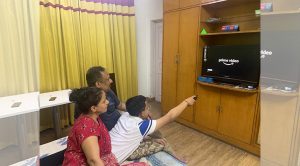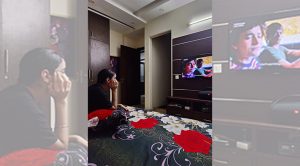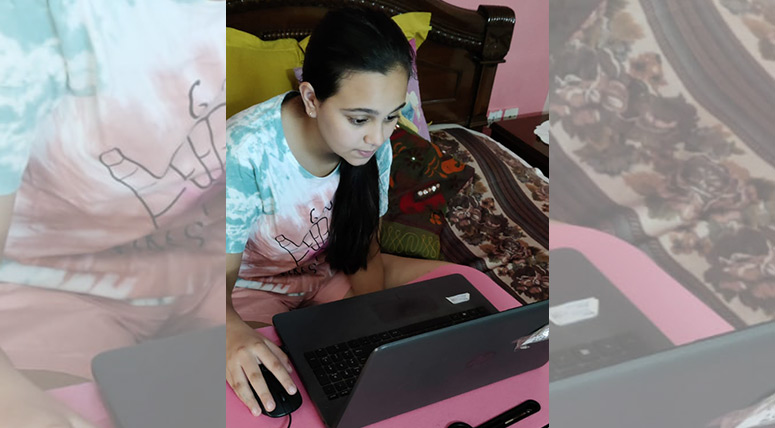Is your child Binge Watching? If yes, let’s read what effect can this have on you and your children’s mental health?

Succinctly stating the word ‘Binge’ implies a period of excessive indulgence in an activity especially eating, drinking, etc. In the last few years, thanks to the advent of so many online platforms, another dimension has been added to binge eating, binge drinking and that is ‘binge watching OTT’. Before we decode and delve deep into binge watching and its repercussions especially on growing children and students, let us try to understand what OTT stands for. This abbreviation stands for ‘over-the-top.’ OTT is a means of providing television and film content over the internet at the request of individual customer and to suit the requirements of the individual customer.
Contrary to the common belief, binge watching is not a novel concept. Those who grew up in the 80s or 90s eras would vouch for watching three, or as many as one could pack into the stipulated time for which a VCR was rented, movies back-to-back. But that would happen only on rare occasions owing to dearth of resources, strict parental discipline, etc.
In today’s times things have changed drastically as one does not have to go through the grind of renting a gadget to binge watch movies or series. OTT platforms like Netflix, You Tube, Disney, and many more, stream plethora of series that can be watched in one go from the comforts of one’s bedroom. With access to thousands of TV shows, movies and documentaries, one can just watch anything, anywhere in the world without interruption.
Children today are raised in such a fashion that they have become accustomed to instant gratification with everything at their disposal at the click of a button. They find it cumbersome to wait for an entire week before a new episode of their favourite show finally airs. Though agonizing, but earlier, the gap of one week allowed family members to indulge in fanciful speculations about the plot twists and enjoy animated talks pertaining to the show. This transition from weekly affair to marathon viewing does not augur well for all and particularly students in general. Words and phrases like ‘excessive’ and ‘over-the -top’ by any standards and in any language of the world do not have positive connotations.

Binge watching OTT has far reaching adverse effects not only on the physical and mental well-being of the students but it grossly affects the emotional quotient too. It has been scientifically proved that those students, who spend incessant hours watching their favourite shows, complain of disturbed sleep, higher anxiety levels, poor physical health, frequent headaches, changes in eating patterns all the while promoting a more sedentary lifestyle. As they remain glued to their screens, they tend to ignore other significant aspects of life- be it academics or interpersonal or intrapersonal relationships.
Binge watching is like a drug as it leads to a ‘high’. When a child is engaged in watching any series for a long stretch of hours, his/her brain produces dopamine- a chemical that promotes feelings of pleasure, excitement and happiness. The release of the said chemical makes one feel good and it results in producing a ‘high’ akin to that induced by drugs and other substances that are addictive in nature.

Just like any other activity watching television has always been one of the various ways to unwind. It can actually bring a temporary refuge from all the anxieties of life as long it is done in moderation. However, binge watching can easily make people disconnect from other people, family and friends causing grave issues like isolation and zone out for hours at a stretch. Squeezing in just one more episode can cause students to stay up late and consequently making their whole routine go haywire resulting in fatigue, laziness, and inability to concentrate in class the next day.
Deprivation of sleep makes them irritable they are always on their tenterhooks to pick up a fight at the drop of a hat. Young children are, unfortunately, turning into couch potatoes courtesy binge-watching with much reduced outdoor physical activities that help inculcate important life skills while participating in team sports and other games. Snacking while binging can lead to lifestyle diseases like obesity, and high levels of cholesterol among school-going children which can, indeed, spell disaster in the future.
Red flags of Binge Watching are far too many to ignore as it is affecting the young generation at an alarming rate. As adults – teachers as well as parents- we need to have concrete conversations with students about the perils of ‘Binge Watching’ so that we are able to filter the spade of information they passively consume. Unmonitored watching of the content can affect the impressionable minds of the students beyond repair as children learn by observing the actions of others, be it real or reel life, provided a balanced approach is adopted earnestly by the students.
TV viewing can actually prove to be a fruitful source of entertainment where family members can bond together by spending some quality time together. But at the same time, keeping a watch over the content their children are processing in their minds is equally necessary.

Students must be encouraged to intersperse watching videos with other forms of recreation rather than watching an entire series in one go. It is high time we accept that as parents, we too, have taken the easy way out to relax by plopping ourselves on our comfortable sofas or beds to watch our favorite show rather than sweating it out in the field playing those sports that we would give anything in the world to play for a few more hours when we were kids. So, as adults let’s ourselves take a break from the screen and set examples for our kids to emulate by engaging in more outdoor activities and thus leading a healthy, happy and spirited life.
Author: Ms. Alka Prashar, PGT English, MRIS 46





